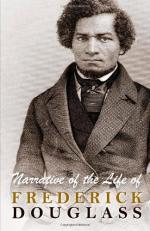|
|
The Narrative of the Life of Frederick Douglass Chapter 11
Douglass comes to the point in the narrative where he successfully makes his escape. He does not recount the details of his escape so that he does not reveal the secrets that would prevent other slaves from escaping. He even disapproves of some in the west that publicize their involvement in the underground railroad, citing that they should not hinder further escape attempts by enlightening the slaveholders of the methods of escape.
Before his escape, Douglass detests having to give up his hard-earned money to Master Hugh. Sometimes he would receive a cent per dollar he made, which he regards as insulting. He asks Master Thomas whether he could hire out his time to earn some extra money. Master Thomas refuses because he feels Douglass will try to escape. Later, Douglass asks Master Hugh who agrees on the condition that three dollars be paid to him every week. Also, Douglass would be responsible for his own living expenses. The deal is in Master Hugh's favor. Douglass observes, "He received all the benefits of slaveholding without its evils; while I endured all the evils of a slave, and suffered all the care and anxiety of a freeman." Chapter 11, pg. 140 After several months of tireless labor, Douglass is able to set aside some money. But when he misses one week's payment because he goes away to a camp meeting in Baltimore, Douglass is no longer allowed to hire his time. It is then that Douglass decides to attempt his escape. To prepare, he finds employment at a shipyard and for three weeks, works hard to make Master Hugh happy with the money he makes for him. Nearing the date of his planned escape, Douglass struggles with having to leave his friends and loved ones in Baltimore. On September 3, 1838, Douglass succeeds in reaching New York, at last, a free man.
As a stranger in a new place, Douglass undergoes a short period of intense loneliness and insecurity. But with the help of Mr. David Ruggles and other abolitionists, Douglass is able to settle down with his newly wedded wife, Anna, in New Bedford, Massachusetts. They are helped out by the abolitionists, Mr. and Mrs. Nathan Johnson. Douglass, who at the time is referred to as "Frederick Johnson," decides to change his name again. Mr. Johnson suggests the surname "Douglass" from a book, Lady of the Lake, and it becomes his permanent name.
Douglass is surprised to find that the North, without slave labor, can be so prosperous. He discovers that the people of the North, both white and colored, live far better than even wealthy southerners. Douglass sees in Mr. Johnson, the embodiment of the free colored person of the North-refined, dignified, and generous. The colored people of the North are united in their efforts to help escaped slaves, in one case, scaring a colored betrayer with death. Douglass works for three years in various labor-intensive jobs before he becomes a well-renowned abolitionist. His interest in the abolitionist movement is fueled by reading The Liberator, a newspaper that stirs his soul in fighting for the anti-slavery cause. While attending an anti-slavery convention at Nantucket on August 11, 1841, Douglass, with encouragement from Mr. William C. Coffin, speaks for the first time to a white audience about slavery. From that time on, Frederick Douglass becomes one of the foremost figures of the abolitionist movement.




